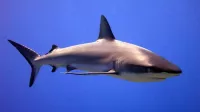Shark Week is an annual week-long television event on the Discovery Channel dedicated to shark-themed programming. Launched in 1988, it aims to promote shark conservation and dispel misconceptions. It has grown into a highly popular and long-running cable television event, broadcast in over 72 countries. Owned by Warner Bros. Discovery, Shark Week is heavily promoted on social media and episodes are available on various streaming and digital purchase platforms. Selected episodes are also available on Max, Hulu, and Discovery+.
July 1988: First Shark Week Premieres
In July 1988, the first Shark Week premiered, with the first show to air being Caged in Fear. A total of 10 episodes aired, including Sharks: Predators or Prey, The Shark Takes a Siesta, and Sharks of a Different Color. The success of the block led Discovery to continue it.
July 17, 1988: Shark Week Premiere
On July 17, 1988, Shark Week premiered on the Discovery Channel. It was a week-long programming block focusing on shark-themed content.
2000: Shark Week Uncaged
In 2000, Discovery Channel aired Shark Week Uncaged, which was presented by zoologist Nigel Marven. Six million 3D Pulfrich glasses were distributed to viewers in North America for an episode featuring an extinct giant shark, which had 3D segments.
2000: Hosting by Notable Personalities Begins
Starting in 2000, programming for Shark Week began to be hosted by notable personalities from other Discovery series.
2005: MythBusters Hosts Shark Week
In 2005, Adam Savage and Jamie Hyneman of MythBusters hosted Shark Week, which premiered with a two-hour MythBusters "Jaws Special".
2006: Mike Rowe Hosts Shark Week
In 2006, Mike Rowe of Dirty Jobs hosted Shark Week, and two Dirty Jobs episodes were produced to tie-into the programming, titled "Jobs that Bite" and "Jobs that Bite...Harder". That year, a 446-foot-long (136-metre) inflatable great white shark named Chompie was hung from the Discovery Channel's Silver Spring, Maryland headquarters.
2007: 20th Anniversary of Shark Week
In 2007, the Discovery Channel celebrated Shark Week's 20th Anniversary, hosted by Les Stroud, host of Survivorman. The 20th anniversary included the launch of Sharkrunners, a video game that uses GPS data from tagged sharks in the Pacific Ocean. The program Ocean of Fear aired on July 29.
2009: Decrease in Research-Oriented Shows
In 2009, less than a quarter of Shark Week shows involved research.
2010: Longest-Running Cable TV Programming Event
Since 2010, Shark Week has been the longest-running cable television programming event in history.
2012: Decrease in Research-Oriented Shows
In 2012, less than a quarter of Shark Week shows involved research.
2014: Deep Blue Featured in Shark Week
In 2014, Deep Blue, a large great white shark estimated to be twenty feet long was featured in an episode of Shark Week; she was seen traversing the waters off the coast of Guadalupe Island.
August 2015: Shweekend Airs
In late August 2015, a new, shark-themed weekend called "Shweekend" aired on the Discovery Channel. MythBusters vs. Jaws aired on Saturday, August 29, followed by Shark Alley: Legend of Dynamite. Air Jaws: Walking with Great Whites aired on Sunday, August 30. The purpose of Shweekend was to increase the shark-related content from past years and to prolong the summer's shark coverage.
2015: Discovery vows to remove docufiction
In early 2015, Discovery President Rich Ross vowed to remove docufiction type of programming from future Shark Week lineups.
2017: Michael Phelps vs Great White Shark Controversy
In 2017, Discovery heavily promoted a race between Olympic gold medal winner Michael Phelps and a great white shark that turned out to be computer generated, but based on actual speeds of such animals, and Phelps wearing illegal swim gear, leading to significant criticism.
2020: Decrease in Research-Oriented Shows
In 2020, less than a quarter of Shark Week shows involved research.
2021: Streaming on Discovery+
In 2021, the events of Shark Week began streaming on Discovery+ along with its telecasts on the Discovery Channel.
2022: Content Analysis of Shark Week Programs
A 2022 study reviewed trends in the content covered by Shark Week, finding that 43% of the 272 programs had titles using words with negative connotations, and around 74% of shows referenced shark bites or other negative portrayals of sharks.
Mentioned in this timeline

Michael Phelps is the most decorated Olympian of all time...

Sharks are cartilaginous fish belonging to the group Selachii characterized...
Canada is a North American country the second largest in...

A video game is an electronic game involving user interaction...

Glasses also known as eyeglasses or spectacles are vision eyewear...

Great White formed in Los Angeles in is an American...
Trending

52 minutes ago Stephen Hawking's Reputation Tarnished: Epstein Files Photo Goes Viral, Sparks Controversy

53 minutes ago Noah Kahan's 'The Great Divide' Reaches Number One & Enters A New Era

53 minutes ago Tarantino's Cliff Booth Spinoff Teased with Fincher, Pitt's Netflix Movie Revealed.

54 minutes ago Chris Stapleton Dampens Hopes: No New Music Imminent, Retirement Speculation Swirls Anew

2 hours ago Ryan Gosling finds right franchise fit with Star Wars: Starfighter after feeling unconvinced previously.

2 hours ago Carey Mulligan on Narnia, Prada, and a Regretted Role Audition.
Popular

Jesse Jackson is an American civil rights activist politician and...

XXXTentacion born Jahseh Dwayne Ricardo Onfroy was a controversial yet...

Hillary Diane Rodham Clinton is a prominent American politician lawyer...

Michael Joseph Jackson the King of Pop was a highly...

Kashyap Pramod Patel is an American lawyer who became the...

Barack Obama the th U S President - was the...